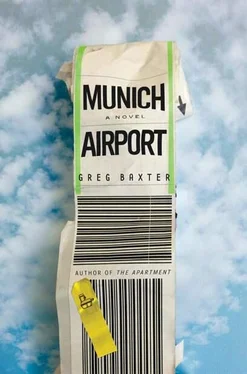I liked my solitude. It wasn’t total. I had plenty of human contact through work, plenty of meetings, plenty of lunches. I did a great many things on my own, in the evenings. I’d always liked classical music, so I got season tickets to the symphony. I went to the library and read, and to bookstores to hear authors talk. I went to hear lectures on just about everything. I went to the opera. I went to gallery openings. I went to the theater. I went to all kinds of festivals. Once in a while, I asked a woman out. I would go out of my way to seek women with whom I was safely incompatible, and over drinks or dinner I’d try to say things that were winning and untrue. I tried to be a little more cheerful without becoming enthusiastic, or dangerous without becoming shadowy, or dark without becoming despondent, or poignant without becoming piteous, or funny without becoming malicious. In many ways this was purely an extension of my everyday work challenges. And the success of these nights was completely measurable, and the relationships were totally disposable. Sometimes, however, the woman and I were not safely incompatible. We actually got along. I found that I liked her or I suspected that she might like me. On these occasions, I didn’t try to say winning things, nor did she. We drank our drinks or ate our dinner, then walked around the city, and all the times it went this way, the woman I was with ended up taking me to a bar she used to frequent long ago, in her twenties. We didn’t speak too much — our compatibility was not of the all-the-same-things-annoy-us variety, nor of the we-love-all-the-same-books-or-films variety — we drank a little bit more than we normally would, and we watched people try to communicate, express themselves, and seduce each other. In the bar to which she would take me, we often had to stand, and if we wanted to talk, we’d usually have to shout, and often the woman, who did not smoke, borrowed cigarettes off strangers, and we went out to stand in the cold night, away from the noise, while she smoked. Sometimes we separated in time for the last trains home, and other times we stayed out so late we had to get taxis. But we separated, and I wished her well, and she seemed to understand that we would never see each other again. I went home. I listened to music on my headphones — even if I was in a taxi — I stumbled around the sidewalk, I wondered whether or not to urinate in some bushes, and when I walked inside my door I made myself a gigantic pan of scrambled eggs, mixed with everything I had in the fridge. Sauerkraut, goat cheese, jam, barbecue sauce, whatever meat I had, and any vegetable that did not stink and wasn’t moldy.
Trish sits down beside me. She stretches her legs out. She yawns. Then she takes out her sunglasses and puts them on, and now we are both wearing sunglasses. I say, What’s your dad like?
My dad?
Yeah, your dad.
Why do you ask?
I don’t know, I was just asking.
He’s all right.
What does he do?
Does it matter?
Is it a secret?
He’s a teacher, in high school.
He’s not a history teacher, though?
He teaches algebra. And he’s the football coach.
He’s a disciplinarian?
You could say that.
Do you visit home much?
I go back to the States a lot, I don’t go home that often.
She looks down at the bag I have tied up and left beside my feet, and the magazines I’ve taken out of it. Her sunglasses are extremely black, glossy, and I can see myself in them, and I can see the history exhibit that surrounds us, like Stonehenge. I stand up. It’s a history exhibit about women in aviation, and it’s in German, English, and French. It begins with Katharine Wright and Baroness Raymonde de Laroche, and it ends with astronauts, test pilots, and corporate leaders in the aviation and aerospace industries. There are two panels devoted entirely to German women aviators. Hanna Reitsch, I read, was a test pilot for the Luftwaffe and a protégée of Hitler. As one of the few women who broke from traditional roles in Nazi Germany, she flew the first helicopter, the piloted version of the V-1 buzz bomb, and the rocket-powered Messerschmitt Me 163. She was the first person to demonstrate a helicopter to the public. After that there is of course a panel about aviation and the Holocaust, because you cannot have an exhibit in Germany, it seems, without mentioning the Holocaust. It feels right, even though it sometimes feels unnecessary. There is also a panel that seems disconnected from the story of the exhibit, a single panel with a brief and uninformative history of Munich Airport. I decide I want to know more, so I sit down and open the Internet on my phone. I read what I find out loud to Trish. Munich Airport is just over twenty years old, I say. It’s the second-busiest airport in Germany, the seventh-busiest airport in Europe, and the twenty-seventh-busiest airport in the world. Over forty million passengers pass through it per year. Its full name is Flughafen München Franz Josef Strauss. Franz Josef Strauss was the youngest-ever German minister for defense, a minister for finance, his party’s chairman, and, for his last ten years in public office, the president of Bavaria. Trish gives me a look that says, Are you really going to continue? So I do not. I simply read it silently. The most interesting things about Strauss, it seems, are that he jailed a newspaper editor under false pretenses for more than a hundred days, and was accused of accepting bribes from Lockheed in return for the purchase of nine hundred F-104G Starfighters. Strauss was a pilot himself, and served as the first chairman of the supervisory board of Airbus. Before this airport was built, flights went out of Munich-Riem Airport, an area that now contains a convention center, lots of apartments, and parks, and is called Messestadt Riem, or Convention City Riem. Munich-Riem was home, in 1945, to possibly the greatest-ever collection of German fighter pilots, the Jagdverband 44. The commander was General Adolf Galland, the former General of Fighter Pilots, who had recently been removed from his staff post by Hermann Göring for relentlessly criticizing the operational policies, strategic doctrine, and tactics mandated by the Luftwaffe High Command. It was hoped by Galland’s superiors that his return to combat flying in a front-line command would result in his death in action. He was only wounded. Munich-Riem Airport was the site of the Munich Air Disaster, which resulted in the deaths of eight Manchester United soccer players — their plane crashed while trying to take off from a slushy runway. It was also the site of the Munich Massacre of 1972. In 1982, there was a bomb attack on passengers headed to Israel. The closest concentration camp to Munich was Dachau. The new airport — the one through which we are passing — is less than twenty minutes away from Dachau. Himmler called Dachau the first concentration camp for political prisoners. Strangely, not far from our first hotel in Berlin, there was a park with a water tower in it, and a plaque outside it claimed that it was the site of the first concentration camp for political prisoners. Of course, they would have been on entirely different scales. On my phone, I enlarged pictures of bodies in trucks, dead bodies being placed into crematoria. Pictures of children on their way to death. Images of fat and smiling guards on short vacations in the woods nearby. Late in the afternoon of 29 April 1945, the camp at Dachau was surrendered to the US Army. I read the following passage, written by Brigadier General Henning Linden, which describes the surrender — As we moved down along the west side of the concentration camp and approached the southwest corner, three people approached down the road under a flag of truce. We met these people about seventy-five yards north of the southwest entrance to the camp. These three people were a Swiss Red Cross representative and two SS troopers who said they were the camp commander and assistant camp commander and that they had come into the camp on the night of the twenty-eighth to take over from the regular camp personnel for the purpose of turning the camp over to the advancing Americans. The Swiss Red Cross representative acted as interpreter and stated that there were about a hundred SS guards in the camp who had their arms stacked except for the people in the tower. He said he had given instructions that there would be no shots fired and it would take about fifty men to relieve the guards, as there were forty-two thousand half-crazed prisoners of war in the camp, many of them typhus infected. He asked if I were an officer of the American Army, to which I replied, Yes, I am Assistant Division Commander of the 42nd Division and will accept the surrender of the camp in the name of the Rainbow Division for the American Army.
Читать дальше











